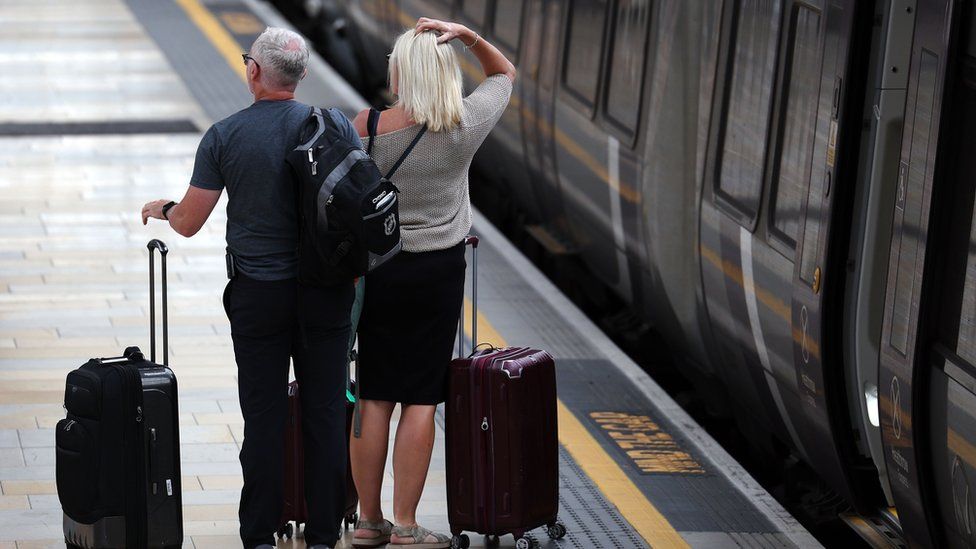
Last month’s strike saw many looking for alternative transport – expect similar scenes this weekend
By Christy Cooney
BBC News
Passengers across England have faced Bank Holiday weekend disruption as 20,000 rail staff staged their latest strike on Saturday.
Mick Lynch, head of the RMT union, said strikes would continue until a new pay settlement for workers is reached.
The Department for Transport said rail staff have received “fair and reasonable” pay offers.
Workers from 14 train operators are taking part in Saturday’s strike, which is its 24th since last summer.
The action has seen a reduced timetable in place in much of England, with some journeys into Scotland and Wales also affected.
Around half the usual services were running on Saturday and trains started later than usual and will finish earlier, while some areas have had no services all day.
Further action by the RMT is planned for 2 September, while member of the train drivers union, Aslef, are set to walk out on 1 September.
As well as a new pay deal, the RMT is demanding an end to job losses resulting from the closure of hundreds of ticket offices.
Image source, Getty Images
Leeds festival is already in full swing, with thousands already on site – but many more have day tickets for Saturday and Sunday
Speaking to BBC Breakfast, Mr Lynch said the union would not accept a pay offer which requires job cuts, adding that ticket office closures would make the railways inaccessible to vulnerable people.
Despite the disruption caused by the strike campaign, he said the RMT has support among passengers, adding: “The public don’t want to go where this Conservative government is taking them in terms of the railway.”
Mr Lynch said 2,300 staff members would face redundancy under the pay offers it has received so far.
“We want a decent pay rise, we’re not greedy, we haven’t had an offer of a clean pay rise without strings attached,” he said.
“And we’re not willing to fund these very modest pay rises through jobs cuts, and cuts to the services, that will affect our members and also the travelling public.”
In a separate interview with the BBC, Mr Lynch said that “there will be more strikes if there’s no change”.
Earlier this year, the Rail Delivery Group (RDG), which represents the train operators, made an offer that would have seen rail workers receive a backdated pay rise of 5% for 2022.
A further pay rise for 2023 would then have been conditional on reforms to services.
On 5 May, RMT members voted to extend the strike mandate for another six months.
The rail industry was badly impacted by the pandemic, and industry figures have argued changes to ways of working will be necessary in order to finance any pay rise.
Ahead of Saturday’s strike, the RDG said the action had been “designed to deliberately target passengers who want to enjoy various sporting events, festivals, and the end of the summer holidays”.
A Department for Transport spokesperson said: “The government has played its part to try and end these disputes by facilitating fair and reasonable pay offers, but union leaders refuse to allow their members to vote on them.
“By cynically targeting the bank holiday weekend, and driving more passengers away from train travel when our railways are already losing £10m a day even without industrial action, the RMT’s strikes are damaging its own industry’s future.”
Additional reporting by Sean Seddon
Are you a striking rail worker? Or a passenger whose journey is affected? Share your experiences by emailing haveyoursay@bbc.co.uk.
Please include a contact number if you are willing to speak to a BBC journalist. You can also get in touch in the following ways:
If you are reading this page and can’t see the form you will need to visit the mobile version of the BBC website to submit your question or comment or you can email us at HaveYourSay@bbc.co.uk. Please include your name, age and location with any submission.








